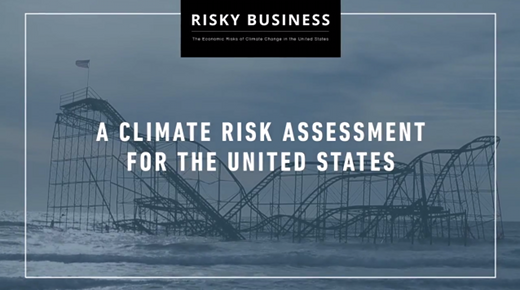
The American economy could face significant and widespread disruptions from climate change unless U.S. businesses and policymakers take immediate action to reduce climate risk, according to the report, “Risky Business: The Economic Risks of Climate Change in the United States”. The publication summarizes findings of an independent assessment of the impact of climate change at the county, state, and regional level, and shows that communities, industries, and properties across the U.S. face profound risks from climate change. The findings also show that the most severe risks can still be avoided through early investments in resilience, and through immediate action to reduce the pollution that causes global warming.
The report is a concrete example of how climate sciences combine a variety of disciplines, skills and knowledge working together on an integrated assessment of climate change implications for the society and the environment. In fact, analysis of the range of potential climate impacts to the US for the report – authors say – is based on climate projections developed as part of the Coupled Model Intercomparison Project Phase 5 (CMIP5), including the experiments performed through CMCC climate models, implemented in several configurations: the high-resolution version of the CMCC climate model (CMCC-CM), the CMCC Earth System Model (CMCC-CESM) for the assessments of the carbon cycle feedbacks, and CMCC Climate Model with a resolved Stratosphere (CMCC-CMS).
The Risky Business report shows that two of the primary impacts of climate change – extreme heat and sea level rise – will disproportionately affect certain regions of the U.S., and pose highly variable risks across the nation. In the U.S. Gulf Coast, Northeast, and Southeast, for example, sea level rise and increased damage from storm surge are likely to lead to an additional $2 to $3.5 billion in property losses each year by 2030, with escalating costs in future decades. In interior states in the Midwest and Southwest, extreme heat will threaten human health, reduce labor productivity and strain electricity grids.
Conversely, in northern latitudes such as North Dakota and Montana, winter temperatures will likely rise, reducing frost events and cold-related deaths, and lengthening the growing season for some crops.
The report is a product of The Risky Business Project, a joint, non-partisan initiative of former Treasury Secretary Henry M. Paulson, Jr., Mayor of New York City from 2002-2013 Michael R. Bloomberg, and Thomas P. Steyer, former Senior Managing Member of Farallon Capital Management. They were joined by members of a high-level “Risk Committee” who helped scope the research and reviewed the research findings.
More content
- The Risky Business Project website;
- Explore the full report The Risky Business – The Economic Risks of Climate Change in the United States;
- Bipartisan Report Tallies High Toll on Economy From Global Warming, an article from the NYTimes
- CMIP5 and the CMCC Climate Projections


